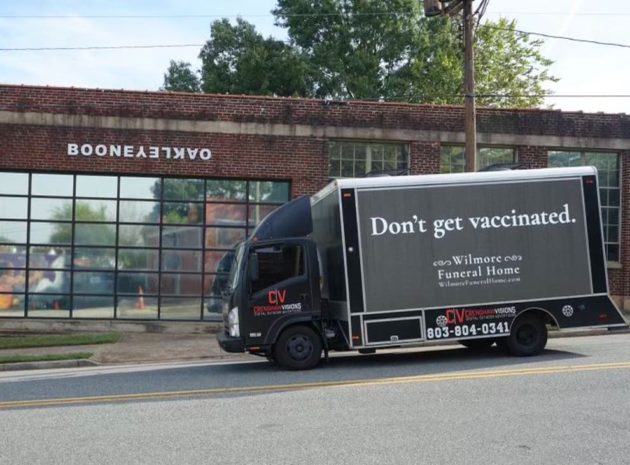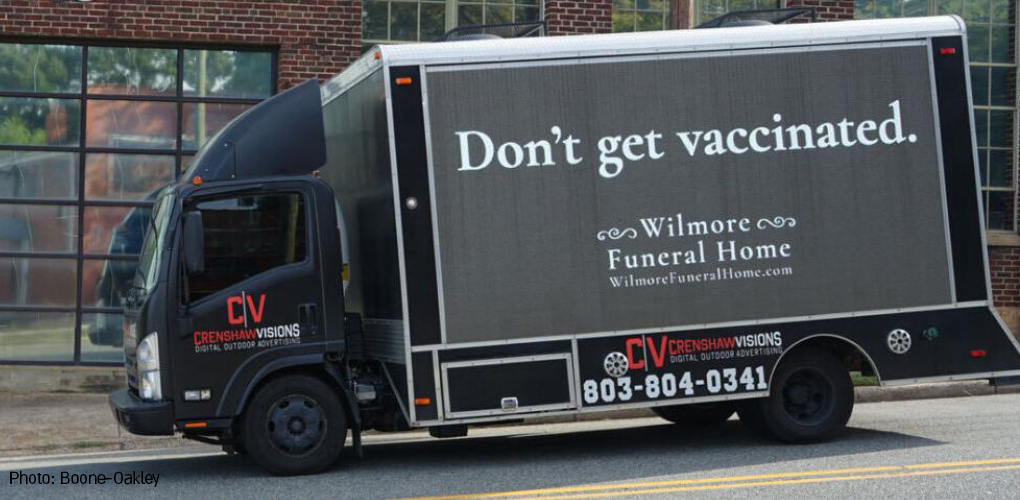From a well-planned guerilla operation by a small local firm to the formidable content arm of a hi-tech company that won accolades at the Cannes Festival. The brilliant ideas of the past year that caused us to slam our heads against the computer screen and yell out, "Why didn't I think of that?"
1. Don't Get Vaccinated | Boone-Oakley
Many of the fans who arrived one weekend in September at the Bank of America Stadium in Charlotte, North Carolina, to cheer on their hometown football team, the Charlotte Panthers, did not miss the black truck that by chance passed them on the way from the parking lot. This truck belonged to a funeral home, upon which it was written in giant white lettering, "Don't Get Vaccinated."
They did what any normal person did in 2021; they took out their telephones, took a picture and posted it online. Wilmore, the company's name, appeared on the vehicle. Whoever was curious and googled to see whom these people with their black humor are working for a funeral home found a website relatively thin in details, but one that seemed legitimate. Over the next 24-hours, the sarcastic truck that called on people to become infected with the Coronavirus so that its owners' business might increase gained worldwide fame.
The next day though, it was made clear that everything was fictitious from A-Z (including the truck circled the stadium in such way, that each time enough people would get a glimpse of the truck passing and think that they were the only ones to notice it). Everything except the objective: to encourage people to get vaccinated. Behind this successful maneuver stood a relatively small advertising and branding firm that advertised itself successfully in a big way. Moreover, in Charlotte, the number of people who got the vaccine in the following week jumped by 22 percent.
Boone-Oakley enters our list thanks to its profound understanding of the human trait to photograph and post online and thanks to its fearlessness to play with the big boys, even when it is for themselves, and there is no client photo and play it bigtime.

2. Riding the Future | VanMoof
The Dutch company that some call the "Apple of the Bicycles" is coping with the following challenge: When the roads are packed with an infinite number of non-branded electric bicycles manufactured in China and sold cheaply, it must have something that will differentiate it. The solution is the following strategy: VanMoof does not manufacture electric bicycles. It manufactures the vehicle of the future.
How did they arrive at this idea? Last year it focused on the automotive industry in general. The campaign's strategy was: It doesn't matter whether it's an electric car or one that has an internal combustion engine: All of them are our enemy because cars create impossible chaos in large city centers. From here, one concludes; our bike is the personal vehicle of the future.
In its current campaign, VanMoof changed its approach and focused on what it sees as the most intimate sensations, precisely as they are the most global: The insights that were formulated simultaneously in the minds of millions of men and women around a world that has come out (or thought it has come out) of the difficult phases of the Corona pandemic and means: I won't go back, I'm moving forward; it's impossible to live my life as it was before.
On top of this, another practical layer of the meaning of life has been added under the constant risk of a pandemic: Must we move from one place to the next? If so, then alone. Not in overcrowded, non-ventilated, packed trains or buses with people with whom it is unknown whether they've tested positive or negative. And how is all this expressed? A highly technologically advanced e-bike (on the wish list: a range of up to 150 km, automatic gears, owner ID, motor de-activation in the case of theft, a built-in locator app, and more). A coveted, stylish end product that everyone owes to themselves. Whoever won't ride it – not only is he
VanMoof, which discusses its arrival into the Israeli market, enters our list thanks to its brave, if not a pretentious strategy and precise execution. Apple and Tesla have long since become icons, and we are not always capable of comprehending how they created this status for themselves. VanMoof enables us to see what is happening before our eyes, through a combination of design, technology, and megalomania, almost like a force of nature.
3. Iceland-verse / Iceland
From one megalomaniac vision to another: that of Meta – formerly known as Facebook – according to which the future that we all share is to sit around the house, with augmented reality glasses planted on our nose. The prophet and executioner of this vision, Mark Zuckerberg, wants to be the main technology provider that will enable us to pass our days in colorful worlds opposite cool avatars of our friends from work, instead of dragging ourselves to the office and slowly withering away in one more never-ending meeting opposite the grim faces of our colleagues.
Like quite a few of Zuckerberg's public appearances, the announcement broadcast very quickly became a media event full of strange and unpleasant moments. It is one thing to be an anonymous "Twitter bug" who responds within minutes through a meme generator; it is something altogether different to be a country that understands an opportunity has presented itself to emphasize its advantages: Wild, breathtaking landscapes everywhere. How does it look (watch, really watch, don't believe us)? An actor, who is very similar to Mark Zuckerberg, announces a new revolution, Iceland-verse, in which it is possible to go to amazing spaces "without funny devices on your face" and feel real rocks, stand beneath real waterfalls, sit in a room that its window looks out toward amazing landscapes, and so forth and so on – all this when his body language is a tribute to the strange inauguration of the Meta-verse, Zuckerberg's virtual universe and its robotic presentation skills.
Iceland enters our list thanks to its ability to identify a hot agenda among its target audience – and respond at record speed.
4. WeTransfer | The Long Goodbye
It is not even a campaign, only a short, spine-chilling (approximately 12 minutes) film, starring Oscar nominee Riz Ahmed that opens with a daily family situation of a British-Pakistani family – and then it all explodes. Over the summer, the film was awarded three prizes at this year's Cannes Festival and stimulated multiple online discussions concerning racism, multiculturalism and immigration policies.
So, what here is the campaign, you might ask? The Dutch WeTransfer is a unique and relatively faceless company that supplies large file sharing and transfer services. For sure, you have received files from someone in a link that leads to the WeTransfer service. Moreover, we are just as confident that you did not give even 20 seconds of thought about who is behind this company and what they do. Its service is transparent, about as exciting as turning on the lights in the kitchen.
WeTransfer could have inaugurated a campaign that tells about the properties of its product, like speed, reliability, capacity in gigabyte, how it is the best and least expensive way to distribute at ones work files to multiple users. As brilliant as it might be, a campaign like this would have left it as another file-sharing company. So instead, WeTransfer became a creator of content. It established WePresent, defined as the company's "digital art platform." It is a huge source of content that deals with, among other things, articles that expose artists from all over the world and tell about their work processes, while at the same time also containing paintings, music, dance and films. And yes, this same digital platform produced the award-winning film The Long Goodbye that generates all the talk.
So, what does WeTransfer get from this? First, its artistic activity reflects its corporate values: sharing, exchanging thoughts and ideas, and communities that cross boundaries. Secondly, instead of struggling to tell about itself, others provide it with coverage. Or in other words, It is not in the position of "Hi dear sub-editor, would you do me a big favor and stick my item somewhere in the paper" – it is the item.
WeTransfer enters our list thanks to its uncompromising and budget-enriched pathway towards the exciting future of PR.
5. The Bread Test | Spinneys
From our neighbors to the north, Lebanon, a simply brilliant campaign that coped with a complicated challenge: In such as traditional society, in which a discussion of female body parts and their explicit presentation are undoubtedly taboo, how do you get women to check for signs of breast cancer, whether by self-examination or by a physician, male or female? The solution, whose sponsor is the Spinneys supermarket chain (that is active across the Middle East), was initiated in collaboration with the Faculty of Medicine of the American University in Beirut and the Paris branch of McCann. In the campaign, traditional looking Lebanese women knead bread dough into two equal balls. It shows them how important it is, when baking bread, to verify that the dough is uniform, without lumps, or any strange and unusual shapes. Not for a moment, does anyone says anything about tits, breast palpation, or cancerous tumors. Not a word is said – and it is impossible not to understand. It is truly ingenious in its simplicity.
Thanks to the clever way it cracked an issue that is a minefield of sensitivities, the Bread Test enters our list.


